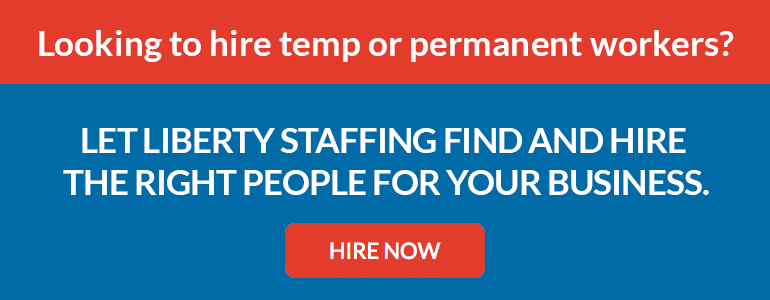 There are many benefits associated with hiring temporary workers, which many business owners want to leverage. If you’re new to hiring and employing people on a temporary basis, though, you probably have quite a few questions.
There are many benefits associated with hiring temporary workers, which many business owners want to leverage. If you’re new to hiring and employing people on a temporary basis, though, you probably have quite a few questions.
These are five questions employers ask most often. They range from the basics of hiring to the liability you have as an employer.
At Liberty Staffing, we would be happy to walk you through temporary contracts, and the hiring process. The answers can help you improve your knowledge of temporary employment arrangements, so you can confidently hire temporary employees for your business.
1. What are the Differences Between Temporary Workers and Contractors?
There are a few different kinds of temporary work arrangements. You may hear temporary employment referred to as temporary work, contract work, or seasonal work.
Seasonal employees are a type of temporary worker. They’re hired for a specific term, often based on seasonality. Many construction jobs, for example, are seasonal. So are jobs on golf courses and at ski resorts.
Other jobs may not be seasonal, but they’re still temporary in nature. The employer hires a worker for a set period of time. At the end of that period, the employee’s contract can be renewed or the employer/employee relationship ends.
Temporary employees work on contract, but they are not the same as contractors. A contractor is an independent worker, hired for a specific project or service. While contract work may seem similar to temporary work, contractors and temporary workers have a different relationship to your business.
2. How is a Temporary Worker Different from a Permanent Employee?
Temporary work lasts for a specified period of time, with a renewable contract. Permanent roles, on the other hand, continue indefinitely.
There are some other differences as well. For example, temporary workers are employed by a staffing agency. These workers are normally on the agency’s payroll, and the agency also administers any applicable benefits.
Temporary workers have many of the same rights as permanent employees. For example, temporary employees are entitled to holiday pay and vacation pay. They also have other rights, such as notice of assignment termination.
3. What are Your Business’s Liabilities?
Whether you hire a temporary worker from an agency, or directly, you’re liable for all aspects of their employment, the same as you would be for a permanent employee.
4. What are the Benefits of Hiring Temporary Employees?
There are many benefits. The biggest advantage is the flexibility temporary employees give your team. As demand increases and decreases in your business, you can quickly add to or reduce your workforce. This can ensure optimal staffing and productivity, while reducing unnecessary labour costs.
5. Can You Hire a Temporary Employee Permanently?
You can transition a temporary employee into a permanent position. One of the best aspects of temporary employment is that it allows you to work with an employee and evaluate how well they fit your business.
This lets you make better hiring decisions for permanent jobs in the company. This is also more cost effective, since it helps you avoid costly hiring mistakes.
Some staffing agencies specialize in many employment placements, including temporary to permanent placements, and can help you with the ins and outs of these arrangements.
If you think you’re ready to hire temporary workers, get in touch with Liberty Staffing. Working with an experienced partner makes the process much smoother.


